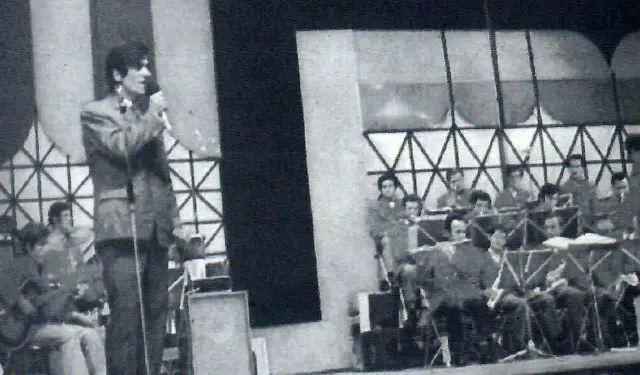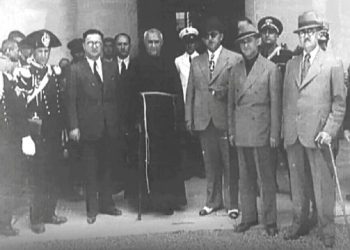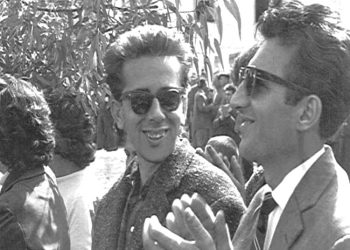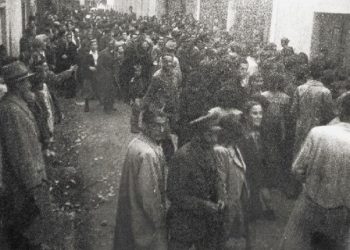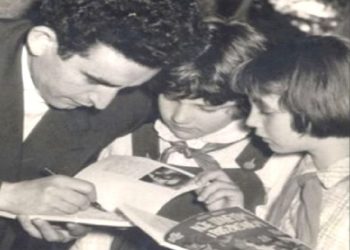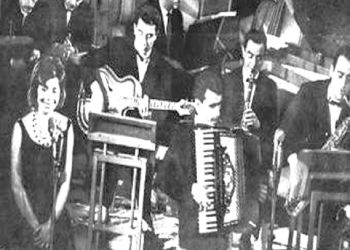Dashnor Kaloçi
Memorie.al publishes an archival document issued by the Central State Archive (fund of the former Central Committee of the ALP), which belongs to January 9, 1973, where Enver Hoxha’s discussion at the meeting of the Presidium of the People’s Assembly of the People’s Republic of Albania, on the topic: “The development of literature and arts to be done in the fight against any foreign ideological influence”, where the main leader focused on the problems of art, culture and literature, mentioning by name some writers and poets, such as Xhevahir Spahiu, about whom he said: he had read his poetry and did not like it, as it seemed to him like a fantasy that he had copied Sartre. The whole discussion of Enver Hoxha held at that meeting of the Presidium of the People’s Assembly just a few days after the 11th Song Festival on Albanian Radio and Television, which preceded the III Plenum of the Central Committee of the ALP, which will marked the beginning of the great ‘storm’ against the people of art and culture, where a large part of them led by Todi Lubonja and Fadil Paçrami who were labeled by Enver as “Head of the anti-party group in art and culture”, will ended up in exile prisons, or production sites in the most remote villages of the country.
“Foreign influences are also noticed in literature, in its various genres. In the magazine “Nëntori”, in the last issue of the year, I read a poem by Xhevahir Spahiu. I do not know him, but I have read some of his writings. My impression is that this literary is … somewhat fantasy. I read the creations of young people because I want to look at their political, mental development, feelings and inspirations. From these creations of young people there are parts that I like, there are those that I do not like, there are also dark or very extreme writings, there are also those that are not worth at all. But all these are published. This is not political, this is not a fair criterion. “Nëntori” magazine and “Drita” newspaper, as organs of the literary press, are interested not in publishing cabbages that are not worthwhile, but in publishing beautiful pieces, to inspire the masses for high goals, for the construction of socialism. But why does this happen? This is because there are editors who are not consistently guided by the great ideas of socialism, who do not consistently follow the straight line and the constant messages of the Party! In the editorial offices of these bodies there is subjectivism, there is hatred, there is a one-sided tendency, without excluding the tendencies to publish the writings of some and to criticize some others, even, in a denigrating way, even to insult them “. This is what Enver Hoxha said at the meeting of the Presidium of the People’s Assembly on January 9, 1973, which was held just a few days after the end of the 11th Song Festival on Radio Television, which as it is known would take place then objected initially to the meeting of the III Plenum of the Central Committee of the ALP, which was held on March 15 and 16 of that year. Plenum which was also the beginning of the blow by Enver Hoxha against the main organizers of that festival, such as Todi Lubonja, General Director of Radio-Television, Fadil Paçrami, secretary of the Tirana District Party Committee covering art, culture and propaganda , who were also labeled as “Anti-party group in art, literature and culture” and would end up in prisons and internments along with some writers and artists and well-known figures of art and culture, such as Mihal Luarasi, the director of the Festival of 11th, playwright Minush Jero, writer and journalist Ibrahim Uruçi, etc., etc. For more on what problems Enver Hoxha discussed in that meeting that was and the prologue of a great ‘storm’ that would later explode against the people of art and culture, we know the document in question that Memorie.al publishes in full in this writing.
Continues from the last number
Speech of Enver Hoxha held on January 9, 1973, at the meeting of the Presidium of the People’s Assembly
DEVELOPMENT OF LITERATURE AND ARTS TO BE DONE IN THE WAR AGAINST ANY FOREIGN IDEOLOGICAL INFLUENCE
Discussion at the meeting of the Presidium of the People’s Assembly of the Republic of Albania
January 9, 1973
Of course, letters are written a lot, but some of them are also written by fans of music with foreign influences, who are either snobbish or are still young unformed. The downside is that some music program organizers or speakers are only aware of these letters or, worse, only advertise them, in order to form biased and undesirable opinions. In fact, most young people write letters about these issues as well, in which right attitudes are maintained. I too have been written from these letters. I have been written by workers from Lushnja and not one or two, but dozens, who in letters make direct criticisms of these songs. Even school teachers have written to me and told me: how is it possible to be allowed to be young with cowboy clothes, with hair around the neck and over the ears, with such long favorites, as we often see some students, even some young workers!
It is not at all fair to remain passive and indifferent to these performances. A school teacher writes to me that when she tells students how they should look and behave, they respond: You, the teacher, tell us to be polite, with regular appearance, but we are watching people on TV with dress, with hair and looks that you have criticized us. But what appears on television is official. No, comrades, these things are not official, but smuggling. The party wants beautiful, simple, understandable things, of course with a high artistic level and always harmonized with its line. We fight foreign shows. We must fight resolutely, openly and without concessions, even those elements of foreign ideology that penetrate us through music and art.
But I want to emphasize once again that, with what I am saying, we should not understand that we are against research in art, against innovation and freshness, against efforts to develop our music and arts in such a way that they truly reflect the rapid, dynamic development of our society, of our entire socialist life and to respond to the educational, cultural level and the ever-increasing demands and aesthetic tastes of the working masses and especially of our youth. Foreign influences are also observed in literature, in its various genres. In the magazine “Nëntori”, in the last issue of the year, I read a poem by Xhevahir Spahiu. I do not know him, but I have read some of his writings. My impression is that this literary is … somewhat fantasy. I read the creations of young people because I want to look at their political, mental development, feelings and inspirations.
From these creations of young people there are parts that I like, there are those that I do not like, there are also dark or very extreme writings, there are also those that are not worth at all. But all these are published. This is not political, this is not a fair criterion. “Nëntori” magazine and “Drita” newspaper, as organs of the literary press, are interested not in publishing cabbages that are not worthwhile, but in publishing beautiful pieces, to inspire the masses for high goals, for the construction of socialism. But why does this happen? This is because there are editors who are not consistently guided by the great ideas of socialism, who do not consistently follow the straight line and the constant messages of the Party! In the editorial offices of these bodies there is subjectivism, hatred, there is a one-sided tendency, without excluding the tendencies to publish the writings of some and to criticize some others, even, in a denigrating way, even to insult them.
Of course, there will be and should be criticism, but not insults. It is not at all in the line of the Party that people who rightly criticize some bad creations should be told “you are conservative”, “you do not understand the new”, “you do not support the new forces”, etc… No, it is not right to do so, just as one should not be allowed to take a disrespectful attitude towards young people, towards the new values that they can bring to creativity. But let’s get to the poems I mentioned. She is confused. With it, it seems, he wanted to show himself that he knows a lot, but when he reads it, he sees that Sartre’s philosophical concepts have entered this poem. The whole philosophy of this is more or less what is said in the poem: “I am who I was not, I will be who I am not”. This young author has taken this view of Sartre, copied it, made it his own, perhaps thinking that others do not know what Sartre is and his philosophy. Of course, to find the essence of Sartre’s philosophy is very difficult, because you have to read some of his publications first, to know his philosophy.
Sartre is the creator of the current of existentialism. So, you have to know a lot about him to understand his anti-Marxist philosophy, even though Sartre claims it is not. Sartre’s philosophy, no matter what he says, is anti-Marxist, foreign, unacceptable to us. I am returning once again to what I have emphasized that we should carefully use the great fund of our national culture and art, to develop our folk music and dances of all the provinces of the homeland. We must not forget the past of the people. Our people have created songs, but they have sung these in the periods and historical circumstances of the time they lived. But we, when evaluating our past and present development on the basis of the teachings of Marxism-Leninism, are better able to explain their value and content depending on the period in which they were created.
These songs have inspiration in the glorious history of our people. We can also process and style them, but during this work we should not change their essence and popular character; to preserve in them the basic characteristics from the inside and from the form. Specifically, when singing, for example, today the song of Çelo Picari, we are able to analyze the historical circumstances in which it was created and sung, therefore, when it comes to its elaboration, care must be taken not to lose character its popular. With what I explained I do not mean at all that we are conservatives, nor are we for it to remain only in folk songs. We are not backward, so we have opened all these schools, in order to give an even greater development to our new socialist music.
It is not necessary to always put only folk songs in our shows, therefore to make even more new creations, which have the color and musical intonation of the people and the homeland and be really beautiful. Here I spoke more about the struggle against today’s perverted influences of bourgeois ideology and culture, but we have not left without fighting, we even continue to fight vigorously against the old ideological influences, against any kind of conservatism, in all areas of life., so also in the field of culture. We have hit hard on conservatism even in different traditions and habits of life. But it still has strong roots and weighs heavily, especially in the lives of women and youth. Conservatism cannot fail to appear, also, in the broad field of literature and the arts, in general culture, especially when it is nourished by outdated and anachronistic routines and by various dogmatic and schematic meanings.
Therefore, as I have said other times, in this field, we fight against any kind of foreign ideological influence, wherever it comes, we fight, as it were, on both sides, even against outdated conservative and reactionary traditions, even against today’s perverted, bourgeois-revisionist influences. But in waging an active struggle against the various manifestations of conservatism, we must not fall into liberalism, lose vigilance against the perverted influences of today’s bourgeois ideology and culture. We must not minimize these influences, nor remain passive towards them, but fight resolutely and with the necessary revolutionary passion. I emphasize once again that we will preserve and develop positive traditions and experiences. This is a necessary development process that has happened and is happening in other countries as well.
If we follow the world literature, for example, the French one, we see that there are various creations, there are authors, writers and poets who were famous in their time, but who are now extinct and not mentioned. Very-very short names. Yet there are writers and authors who, although created and composed 200-300 years ago, have remained immortal. They have lived and created in another period, but their beautiful works have been inspired by good, progressive thoughts and aspirations, therefore they have resisted the times, the bad ones and have reached alive and beautiful to the present day.
Here I developed some issues related to Comrade Kahreman’s question. Therefore, regarding the problems of culture and art, it is necessary to help the organs of the Party and the government in the district, in order to expand more and more the cultural horizon of our people. For this, the Party must definitely help, which must take measures to correct the shortcomings that appear. This correction should be done with criticism, but when criticizing the shortcomings observed in the field of culture, there are people who, not tolerating criticism, call this “censorship”. But why, will they allow the Party, its leadership and the people to sprout all kinds of cabbages? No, by no means. But why would the Party allow some thieves, Landlord, beys and bayraktars to still graze for the sake of some bourgeois humanism? But when the time came for the creation of agricultural cooperatives, did the Party allow their creation to be hindered, why did the kulaks not want it? No, comrades, we will not allow such attempts.
Our state is a state of the dictatorship of the proletariat and this has a wide meaning. The dictatorship of the proletariat, the leadership of the working class, of the Party, extends also to the field of culture, certainly acting with specific methods and means, considering the present nature of the contradictions that arise in this field. Therefore, to those who frighten us with “censorship”, we say: If attempts are made to undermine the dictatorship of the proletariat, then the latter strikes them. These issues should not be underestimated, comrades. Do not separate these problems from the great economic problems, as well as from the other problems we have ahead to solve. The issue of the development of culture and art is extremely important./Memorie.al








